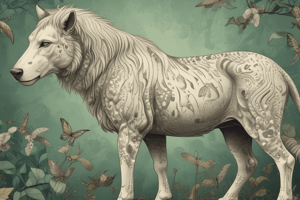Podcast
Questions and Answers
What is one negative consequence of using the Holstein breed for increased milk yield in the Irish herd?
What is one negative consequence of using the Holstein breed for increased milk yield in the Irish herd?
- Enhanced fertility across the herd
- Improved adaptability to environmental changes
- Increase in overall herd size
- Concentration of undesirable traits (correct)
What is the main benefit of progeny testing compared to performance testing?
What is the main benefit of progeny testing compared to performance testing?
- It directly enhances environmental adaptability
- It provides genetic lineage information (correct)
- It leads to improved feed efficiency
- It assesses physical attributes accurately
Which process is defined as 'Survival of the fittest' in the context of natural selection?
Which process is defined as 'Survival of the fittest' in the context of natural selection?
- Inbreeding to enhance desirable traits
- Cloning of genetically identical organisms
- Organisms better adapted to their environment survive (correct)
- Genetic modification of animal traits
What is one approved method of genetic modification in livestock?
What is one approved method of genetic modification in livestock?
What is the primary purpose of understanding genetics in animal farming?
What is the primary purpose of understanding genetics in animal farming?
What was the significance of Dolly the sheep in 1996?
What was the significance of Dolly the sheep in 1996?
Which method is NOT typically associated with producing genetically identical plants in horticulture?
Which method is NOT typically associated with producing genetically identical plants in horticulture?
Which physical trait is associated with Aberdeen Angus cattle?
Which physical trait is associated with Aberdeen Angus cattle?
In the context of performance testing, what is being specifically evaluated?
In the context of performance testing, what is being specifically evaluated?
What is the significance of the gene for the polled condition in cattle?
What is the significance of the gene for the polled condition in cattle?
What does progeny testing evaluate?
What does progeny testing evaluate?
Why is DNA important in animal genetics?
Why is DNA important in animal genetics?
What aspect of genetics does line breeding focus on?
What aspect of genetics does line breeding focus on?
Which of the following best describes selective breeding?
Which of the following best describes selective breeding?
Flashcards are hidden until you start studying
Study Notes
Genetics
- DNA serves as the genetic blueprint for living organisms.
- Identifying animals with high genetic merit through DNA is essential for breeding and improvement.
Genetic Improvement
- Knowledge of animal genetics helps farmers enhance the genetic traits of livestock, improving farm profitability.
- Physical traits, such as being polled in Aberdeen Angus cattle, are dominated by specific genes, influencing farmer selection.
Selective Breeding
- Line breeding involves breeding within a specific lineage to enhance desirable traits.
Performance Testing
- Evaluates bulls based on weight gain and feed conversion ratios compared to peers in similar conditions.
- Key performance indicators include growth rate and feed conversion ratio (FCR).
Progeny Testing
- Assesses the performance of a bull's offspring against other bulls' offspring under controlled conditions.
- Generally more reliable than performance testing alone.
Genotyping and Genomic Selection
- Utilizes genetic information to select for superior traits in breeding programs.
Natural Selection
- Describes "survival of the fittest," where well-adapted organisms pass on desirable traits.
- Example: Holstein breed's introduction to Irish dairy herds increased milk yield, yet it also led to fertility and lameness issues.
- Deleterious genes, like Brachyspina in Holsteins, can adversely affect animal development and survival.
Agricultural Biotechnology
- Cloning results in genetically identical organisms; this has applications in horticulture and animal breeding.
- Dolly, the first cloned sheep, was created in 1996 using somatic cell nuclear transfer.
Genetic Modification
- Involves inserting new genes into an organism's genome, with limited methods approved for livestock.
- Example: Atryn, a drug produced from genetically modified goats' milk, prevents blood clotting and demonstrates the potential of genetic modification in agriculture.
Studying That Suits You
Use AI to generate personalized quizzes and flashcards to suit your learning preferences.




